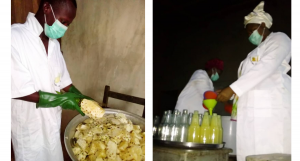Eyes fixed on the ground, boots on, Thomas Tonou waits a few seconds before moving a step forward. It’s 6:30 a.m. and Thomas Tonou is already inspecting his one-and-a-half-acre pineapple plantation. He says, “I verify the pineapples that have ripened. That way, I know what quantity to buy to begin processing pineapple into natural juices.”
The 50-year-old agro-sociologist is married and the father of five children. He lives in Allomey, a village in Allada, a municipality about 50 kilometres from Cotonou, the economic capital of Benin. He cultivates the two most popular species of pineapple in Benin: smooth cayenne and sugar bread.
Mr. Tonou prefers to process the smooth cayenne variety into juice because it is lower in calories.
He says it’s important to ensure he makes juice with high quality pineapples. He says, “We use the fruits that reach M2 or M3 maturity. They are more delicious and suitable for processing.” Pineapples reach M2 maturity when half of the exterior is coloured. At M3, the fruit is completely coloured and ripe. And the taste is exquisite.
Pineapples cannot suffer any shocks from the field to the processing factory. Mr. Tonou says shocks increase the level of fermentation. At the storage facility, the fruits are sorted to remove those that are not up to standard.
Mr. Tonou explains the next steps: “We must clean the pineapples and rinse them twice. Then, [we] peel them, cut them in small pieces, and pass them through the grinding machine. Afterwards, [we] heat the juice to between 90 and 95 degrees. Finally, we have to move on to bottling and capping.”
Mr. Tonou makes one tonne of pineapple juice per day, and three tonnes when he has an order. He generally produces between 1,200 and 1,400 bottles in three sizes: 250, 300, and 330 ml.
He grows only about 15% of the pineapples he needs. He purchases the rest on the local market, paying between 45,000 FCFA ($76 US) and 80,000 FCFA ($136 US) per tonne, depending on the season.
He says business is good: “When we deduct the costs, I can make a net margin of 10,000 FCFA [$17 US] per day.”
Mr. Tonou promotes natural juice production, and is undertaking the necessary procedures to get certification for the quality of his juice.
He hopes to boost his capacity and process 10 tonnes of juice per day. He also wants to install a production line for canning and find new markets to sell more juice.
